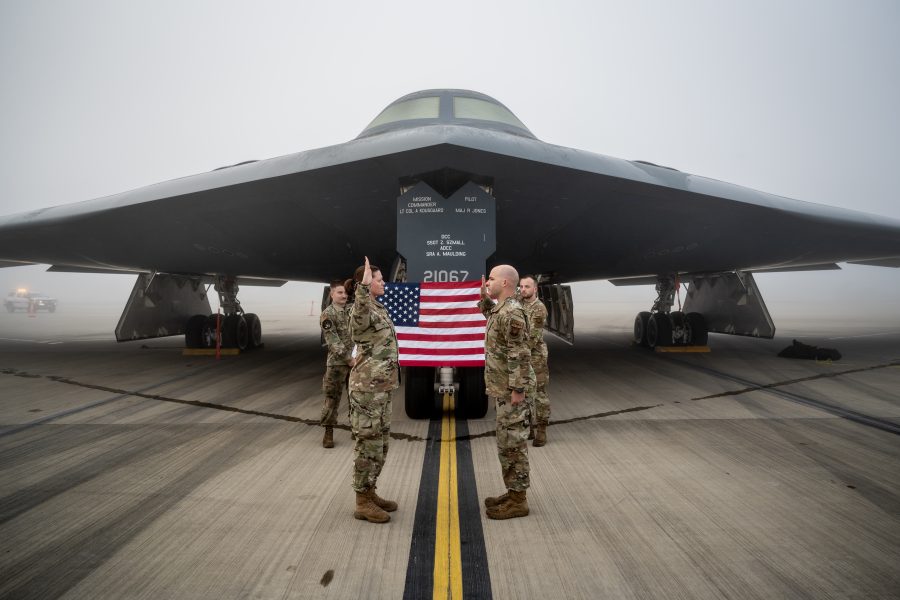Airmen interested in and eligible for selective retention bonuses (SRBs) have just a few days left to apply, as retention runs high and as the Air Force reaches the end of the funding provided by Congress for the program. The program closes on May 20, so officials encouraged Airmen to submit applications by May 19 to avoid any cross-timezone deadline issues.
SRBs are meant to incentivize reenlisting in high-demand career fields such as special warfare, cybersecurity, aircraft maintenance, and intelligence. The size of the bonus depends on the field and the Airman’s time in service, but they can be substantial: in 2024 the Air Force upped the maximum allowable reenlistment bonus to $180,000, with a career cap set at $360,000.
In December, the service expanded the number of eligible career fields to 89, up from 73 the year before and 51 the year before that. The Air Force has nearly depleted the $172 million Congress allotted for SRBs, a service official told Air & Space Forces Magazine.
Had the Pentagon not been operating under a year-long continuing resolution, the Air Force may have had the flexibility to shuffle funding from other areas into the SRB to fuel it the rest of fiscal year 2025, but that’s not the case this year.
SRBs are often split between up-front payments and anniversary payments for each year after the reenlistment. Airmen already in the SRB program will still receive their anniversary payments, but the Air Force will no longer be able to accept new applicants after May 20. Ordinarily, the program would have run until Sept. 30, the last day of FY25.
“We realize there are Airmen who will be disappointed by this,” a service official said. “While we obviously prefer to run an FY25 program to the end of FY25, what I really appreciate is that we have used our entire budget that Congress appropriated for enlisted retention, and we’ve spent it on enlisted retention.”
That’s not always a guarantee: in 2023, for example, the Air Force had to pause bonus programs, permanent change of station moves, and some other incentive pay for nearly three weeks when the service ran out of personnel funds. Higher-than-expected PCS costs, a result of inflation, and higher retention and recruiting bonuses all contributed to the shortfall, officials said at the time.
The Air Force under-executed the FY24 SRB budget by about $50 million, FY23 by about $70 million, and FY22 by about $109 million—the budget for that year was $200 million.
Human behavior is difficult to predict amid a range of external economic factors, so while it is difficult to pin down exactly what made this year different, several changes may have helped. One is that last year the Air Force expanded the reenlistment window from 90 days prior to date of separation to a full 12 months prior to separation, giving troops more time to sign up.
The Air Force also opened the SRB FY25 window in December rather than in May as it did for the FY24 SRB. The number of career fields was also higher than usual, as were the multipliers that decide how large a bonus Airmen receive.
“I think all of those factors combined to drive very high take rates,” said the official, who anticipates a similar level of SRB funding in FY26, though that budget is yet to be finalized.
Retention in FY25 is right in line with Air Force targets, with 89.3 percent of enlisted Airmen staying on and 90.1 percent of Airmen overall doing so. To what extent large SRBs drive retention is unclear: a military personnel budget expert told Air & Space Forces Magazine last year that the Air Force often lacks information on the impact of past bonuses or incentive pays on accessions and retention.
“I can’t tell if a really big bonus offered 10 years ago to people working with computers was effective, because I can’t go back and see if the person who was offered the bonus got out or stayed,” said RAND senior operations researcher and retired Air Force veteran Lisa Harrington, who also called for better integration between personnel budget policy stakeholders to avoid or mitigate shortfalls such as the one that occurred in 2023.
The Air Force official thanked military personnel flights across the service, many of whom who will likely be busy processing last-minute applications over the next few days.


